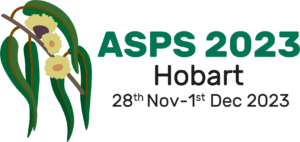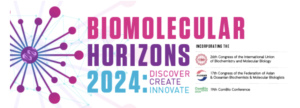Welcome to Phytogen for December 2022
Below are reports from some of our award recipients in 2022. Over the summer break we hope you can recharge and be inspired to submit applications for when awards open in January 2023.
There is also … a save the date for ASPS 2023!!!
Please add yourself to our conference mailing list and help us during the planning stages by filling out our ASPS2023 EOI form: https://forms.gle/osUAvNEyn9jcwtw78
Please share widely with your colleagues and students.
Jan Anderson Award, Frances Sussmilch, University of Tasmania.
My research focusses on the similarities and differences that can be seen in the functions of related genes between diverse plant lineages. I began my research career investigating the genes that regulate flowering in garden pea (Pisum sativum) with Assoc. Prof. Jim Weller’s group at the University of Tasmania. My PhD research left me impressed by the impact that a single nucleotide change in a key gene can have on plant phenotype1, and how useful in-depth knowledge of gene function in one model plant species can be as a starting point for understanding the roles of related genes in other species. As an early postdoc, I worked across three different research groups using molecular biology to address quite disparate research questions relating to i) the genetic control of flowering time and inflorescence architecture in legumes, ii) the evolution of genes controlling stomatal closure in land plants with Asst. Prof. Scott McAdam and Prof. Tim Brodribb, and iii) the diversity of orchid mycorrhizal fungi in Australia with Dr Nigel Swarts. This gave me the opportunity to make valuable contributions to projects that I wouldn’t have initially thought were within my wheelhouse through collaboration with experts in these different fields. Highlights included characterising the genes affected in mutants that had been studied for decades, allowing this wealth of accumulated knowledge to be drawn together to better understand how the affected genes normally function in plant growth and development, including a pea flowering time/photoperiod response mutant2, a fern abscisic acid signalling/sex determination mutant3, and a pea auxin biosynthesis/leaf venation mutant4. Since then, I’ve enjoyed learning new techniques to investigate the evolutionary history of genes known to control angiosperm stomatal opening and closure and the functionality of related genes in diverse extant plant groups, including abscisic acid biosynthesis and signalling genes e.g. 5-8, and ion channels9, 10. I have been fortunate to have been supported by funding from the German Academic Exchange Service (DAAD) and Australian Research Council DECRA and Discovery schemes, and collaborating as an Associate Investigator within the ARC Centre of Excellence for Plant Success in Nature and Agriculture, enabling me to study fascinating aspects of plant biology and work with some great researchers in the process. It is an incredible honour to be recognised by ASPS with the 2022 Jan Anderson Award, and exciting to think about what discoveries in plant science may yet be to come.
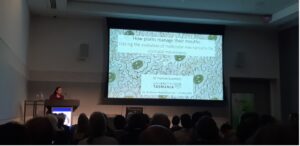
Jan Anderson Award Lecture at ComBio2022. Photo credit: Dr Akila Wijerathna-Yapa.
References
- F. C. Sussmilch et al., Plant Cell 27, 1046-1060 (2015).
- S. Ridge et al., Plant Cell 28, 2545-2559 (2016).
- S. McAdam et al., Proc. Natl. Acad. Sci. U. S. A. 113, 12862–12867 (2016).
- S. A. M. McAdam et al., Plant Physiol. 175, 351-360 (2017).
- S. A. M. McAdam, F. C. Sussmilch, T. J. Brodribb, Plant Cell Environ. 39, 485-491 (2016).
- F. C. Sussmilch, T. J. Brodribb, S. A. M. McAdam, J. Exp. Bot. 68, 2913-2918 (2017).
- F. C. Sussmilch et al., Trends Plant Sci. 24, 342-351 (2019).
- F.-P. Zhang et al., J. Exp. Bot. 69, 1261–1267 (2018).
- I. Dreyer et al., Trends Plant Sci. 26, 41-52 (2021).
- F. C. Sussmilch, M. R. G. Roelfsema, R. Hedrich, New Phytol. 222, 84-90 (2019).
Hank Greenway Award for Education and Outreach: Adelaide University National Science week team: Megan Shelden, Georgia Koerber, Beth Loveys.
Our team was honoured to be awarded the Education and Outreach Award for our delivery of a successful Science Week event in 2021. We presented the award lecture in the Education Symposium stream of the conference; our presentation was titled: Plant Science: Safeguarding our Future Food Security.
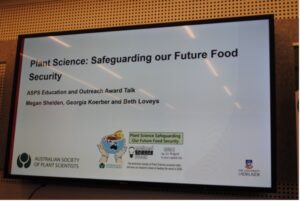 |
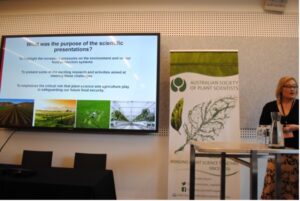 |
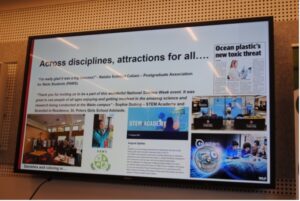 |
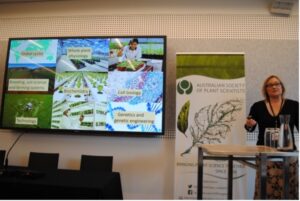 |
Photos of our award talk.
There was a full day of Education focused conference presentations from educators in fields of biochemistry, molecular biology, plant science, cell biology and genetics. It was great to see the fantastic approaches that people were taking to improve tertiary science education for students. Some of the highlights of the Education sessions are described below.
Dr. Saw Hoon from the University of Melbourne described a ground-breaking student-led journal and conference she developed. The journal was inspired by the wonderful essays written by her students as part of the assessment in her course. The essays were so good Saw wanted to give them another life so she decided to create a student-led, peer reviewed journal, “Humans 2.0”. To launch the journal Saw and her students organised a conference to showcase the student work. The student presentations were mixed with those by staff. More can be seen at https://biomedicalsciences.unimelb.edu.au/study/humans2.0
Dr. Anna Galea from UNSW described a student ambassadors’ program which started in biochemistry but is now university wide. Students self-nominate in each course and provide periodic feedback to course coordinators. Students run surveys of their peers, a check in survey early in semester. They also write their own revision questions. https://www.teaching.unsw.edu.au/about-teaching/students-as-partners/student-focus-groups
Dr. James Tsatsaronis from LaTrobe University teaches large classes (approx. 200) of level 2 biochemistry. To manage the class with limited staff he established a program called “Near Peer Mentors”. The near peer mentors were students who had taken the class in the previous year and achieved excellent grades. They allocated 3 small teams of students (5-6) in tutorials where students were working through PBL activities. The near peer mentors supported the junior students, guiding them through the activities that they had themselves done the previous year.
As the students were working in teams part of the assessment was a self and peer evaluation undertaken at the end of each tutorial session. The self and peer evaluation was worth 50% of the tutorial marks. Team structure was not fixed, students were able to select new team members each week (avoiding the problem of students being absent).
There was a student panel discussion where students gave their thoughts and perspectives about online learning during the pandemic. It was very encouraging to see students thriving and prioritizing their mental health.
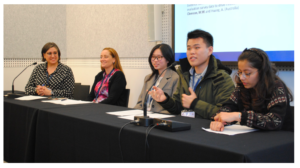
Student led panel discussion.
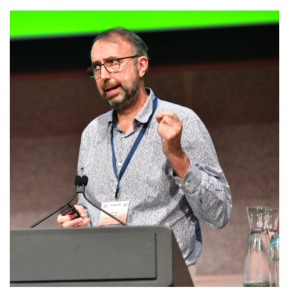
Plenary by Associate Professor Merlin Crosley.
It was fantastic to see an Education focused plenary in the ComBio program this year, Associate Professor Merlin Crosley (DVCA) from UNSW described the challenge of recognising excellence in teaching.
When student experience of learning and teaching at UNSW was analysed, it was apparent that teaching satisfaction scores were higher for Education Specialist staff than standard academics. Prompting the question why do students recognise and value excellence in teaching, but management do not? This observation led to the development of a teaching focused University College, called Scientia Education Academy. By a competitive process, academics were invited to apply for membership of Scientia Education Academy, 40 of the most outstanding educators were selected and celebrated. https://www.education.unsw.edu.au/teaching/scientia-education-academy
|
|
Happy Christmas everyone and have a restful New Year.
Please login and check your ASPS membership is up to date. Encourage your colleagues and students to join ASPS.Tweet to @asps_ozplants your news and upcoming events and follow to keep up to date.

